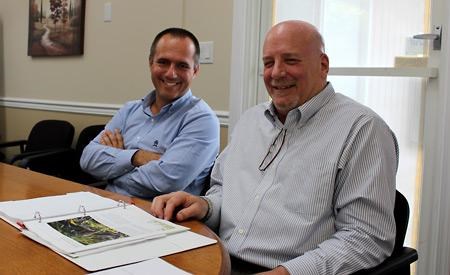Representatives from Wheelabrator Technologies Inc. and Urbaser, both waste management companies, were in Powell River last week meeting with business and community leaders about a waste-to-energy proposal.
Wheelabrator, a wholly owned subsidiary of Waste Management, and Urbaser, a wholly owned subsidiary of ACS group, have been evaluating the potential to host a waste-to-energy project in Powell River.
The project is part of Metro Vancouver’s solid waste management plan, which has been approved by the provincial government. Metro is anticipating that a waste-to-energy facility would handle up to 500,000 tonnes of solid waste which remains after waste reduction, reuse and recycling.
The facility would bring new economic activity to the region during the construction phase, according to Mark Schwartz, Wheelabrator’s senior manager, business development, including hundreds of construction and supporting industry jobs. The project would also bring additional annual economic activity to the City of Powell River during the 50-year operations period, including an estimated 60 new permanent jobs and additional jobs in supporting businesses.
“It’s an exciting opportunity,” said Schwartz. “It’s going to be a long opportunity. There’s lots of competition.”
Proponents will be required to submit bids for both an in- and out-of-region facility. The companies are eyeing Catalyst Paper Corporation’s Powell River mill site as the location for the out-of-region facility.
Paul Henderson, manager of Metro’s solid waste department, said officials reported to Metro’s zero waste committee on Thursday, June 14. “In the original report, we said that we’d be issuing a request for qualifications sometime this summer,” he said.
However, there have been questions about proponents’ level of preparedness, Henderson said, and the likelihood that they would be able to deliver sites as part of the project proposals.
Staff and consultants have concluded that a key next step in developing a recommended procurement process is to conduct interviews with potential project proponents and provide an opportunity for site owners both inside and outside the region to self-identify possible sites. This process is called market sounding.
One of the key questions proponents will be asked, Henderson said, is, “going into request for qualifications process, do they expect to be able to deliver sites as part of their qualifications or not or do they see that as a real barrier to participating?”
The process is expected to take about 90 days. Once the work has been completed, the recommended next steps and updated project timeline will be reported to Metro’s zero waste committee.
The market sounding survey will push the schedule out another three months from the last time it was pushed out three months, Schwartz said. “In that September-October time frame, we’re looking for a pretty robust community outreach program, for meeting and explaining the project concepts and potential opportunities to the citizens of the community,” he said.
After the community outreach, the companies would hire an independent third party to conduct surveys and polling to gauge community support, Schwartz said.
The project involves a waste treatment facility that would involve incineration of garbage, said David Garcia de Herreros, Urbaser’s United States and Canada representative. “We call it waste-to-energy, we call it advanced thermal recycling,” he said.
There are about 87 facilities of this type in the United States, de Herreros added, and about 400 in Europe. “This is proven technology and technologies that have been in the market for quite awhile,” he said.
During the community outreach, the companies will have scientific data available, de Herreros also said. “We’ll bring facts and data from other plants, because something we can bring to the table here is experience on this type of facility.”



